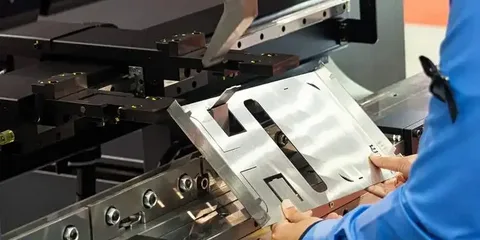Metal fabrication is a crucial cornerstone of modern manufacturing, involving the process of constructing products from raw metal materials. This process can encompass a variety of services, including cutting, bending, welding, and assembling metal parts to create a finished product. Significantly, metal fabrication plays an essential role across various industries, including construction, automotive, aerospace, and more. For professionals and businesses looking to streamline their production processes or create high-quality metal components, metal fabrication services can deliver superior results. (Visit: Metal Fabrication Service)
For those interested in exploring metal fabrication services, a reputable provider such as Woodpeckers Global offers extensive solutions that cater to diverse needs. By clicking here, you can access valuable information about their offerings and how they can enhance your projects.
Key Aspects of Metal Fabrication Service
When considering metal fabrication, it’s essential to understand its key components.
- Cutting: Cutting is one of the initial processes in metal fabrication and can be achieved using various methods such as laser cutting, plasma cutting, or waterjet cutting. Each method provides a different level of precision and efficiency, allowing manufacturers to choose the technique best suited for their specific requirements.
- Bending: Bending involves shaping metal into desired angles, curves, or forms, using hydraulic or mechanical press brakes. This process is vital for creating parts that fit together seamlessly during assembly, making it particularly important in industries like construction and automotive manufacturing.
- Welding: Welding is perhaps the most critical aspect of metal fabrication and involves fusing two or more metal parts together using heat and pressure. Different welding techniques, including MIG (Metal Inert Gas) and TIG (Tungsten Inert Gas), offer varying results, making it essential for fabricators to choose the appropriate method based on the specific materials and end-uses.
- Assembly: Assembly is the final step of the fabrication process and involves putting together various fabricated parts to create a complete product. This step often requires intricate knowledge of design and engineering principles to ensure the final product is structurally sound and functional.
Benefits of Utilizing Metal Fabrication Services
The advantages of engaging in metal fabrication services extend beyond simple manufacturing, exhibition stall design in Mumbai.
- Versatility: Metal fabrication is highly versatile, allowing for the creation of custom solutions tailored to specific project requirements. From intricate metal furniture to robust industrial equipment, fabricated metal components can be engineered for various applications.
- Cost-Effectiveness: Outsourcing metal fabrication can be more cost-effective than maintaining an in-house production line. Businesses can save on labor, equipment, and maintenance costs while gaining access to professional expertise and advanced technology.
- Quality Assurance: Professional fabricators often adhere to strict quality control measures, which can help ensure the finished product meets required specifications and standards. This level of quality assurance can be especially vital in industries like aerospace and medical devices where precision is paramount.
- Time Efficiency: Engaging a metal fabrication service can significantly reduce lead times. With state-of-the-art machinery and experienced personnel, fabrication services can produce components quickly, allowing businesses to meet tight deadlines and enhance their overall productivity.
Real-World Examples of Metal Fabrication Applications
The application of metal fabrication services can be observed in several real-world scenarios. In the construction industry, metal fabrication is widely used in the creation of structural beams and frames that form the backbone of skyscrapers and bridges. For automotive manufacturers, metal fabrication plays a crucial role in producing parts such as chassis, hoods, and brackets that contribute to vehicle performance and safety.
Moreover, in the aerospace sector, companies often rely on precision metal fabrication for components that must meet stringent weight and performance regulations, like aircraft wings and fuselage structures. These real-world implementations illustrate the expansive impact of metal fabrication across various industries.
Challenges and Misconceptions Surrounding Metal Fabrication Services
Despite its importance, the metal fabrication industry faces several challenges and misconceptions. One common misconception is that metal fabrication is only for large businesses or specialized projects, which can deter smaller enterprises from exploring available services. In truth, many fabricators offer services tailored to businesses of all sizes, from low volume jobs to one-off custom projects.
Another challenge is the upfront cost. Some companies may hesitate to invest in fabricated products due to perceived high costs. However, understanding the long-term benefits of quality fabrication, such as enhanced durability and reduced maintenance, can help mitigate this concern. Additionally, the investment often leads to improved operational efficiency and product performance, justifying the initial expense.
Practical Advice for Implementing Metal Fabrication Services
To effectively utilize metal fabrication services, consider the following practical steps:
- Identify Your Needs: Before engaging with a metal fabrication provider, assess your specific requirements and project specifications. This will help you communicate your needs clearly and allow the fabricator to deliver the most suitable solutions.
- Collaborate with Experts: Work closely with experienced engineers and designers, as collaboration can lead to innovative solutions that might not be evident through traditional methods.
- Continuously Evaluate: After the initial project, take the time to evaluate the outcomes and collaboration process. This reflection will help you identify areas for improvement and optimize future engagements with metal fabrication services.
- Build Long-Term Relationships: Establishing a long-term partnership with a reputable metal fabrication provider can yield benefits such as better pricing, prioritized service, and improved understanding of quality expectations.
In conclusion, metal fabrication services play a vital role in modern manufacturing across various industries. By understanding its significance, embracing its benefits, and addressing common misconceptions, businesses can harness the power of metal fabrication to enhance their productivity and product quality. With careful planning and collaboration with experienced professionals, any organization can successfully implement metal fabrication services to meet their specific needs.



